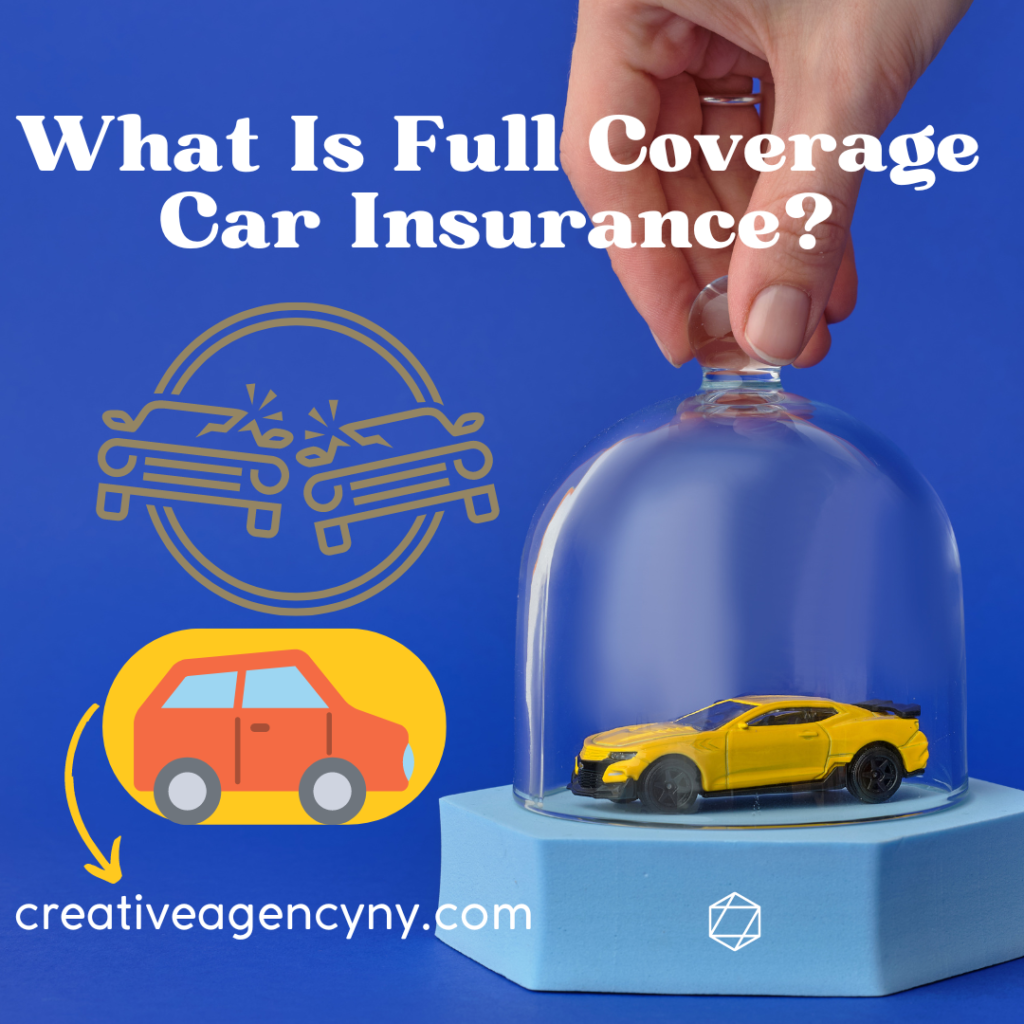
Full coverage car insurance is a type of car insurance that includes different kinds of coverages that can protect your vehicle in case of an accident or other events that may damage it. Usually, full coverage car insurance includes liability coverage, which is mandatory by law in most states, and collision and comprehensive coverage, which are optional but may be required by some lenders or employers.
Full coverage car insurance can give you more peace of mind and financial security if you have a claim or if your vehicle is stolen, burned, vandalized or affected by natural disasters. However, you should know that full coverage car insurance does not exist as such, but it is a term that is used to refer to a combination of coverages that may vary depending on the state, the insurer and your personal needs.
What Does Full Coverage Car Insurance Include?
There is no universal definition of what full coverage car insurance is, nor a policy that you can buy with that name. Full coverage car insurance may vary in how it is structured and in the specific details of each coverage, which may differ between fault and no-fault states. But, in general, when someone describes a full coverage car insurance policy, they mean a policy that includes:
- Liability insurance: Liability insurance offers financial protection if you are at fault for an accident. A liability insurance policy usually includes bodily injury liability coverage and property damage liability coverage.
- Collision insurance: Collision coverage will pay for damages to your own vehicle after an accident. It covers your vehicle if you hit another object, such as a car, a tree, or a wall.
- Comprehensive insurance: Comprehensive coverage pays for vehicle damages resulting from incidents other than collisions. This includes falling objects, hitting an animal, fire, and vandalism. It also will pay if your car is stolen.
In addition to liability, collision, and comprehensive insurance, full coverage may also include other types of coverage, especially if they are required by state law. As such, a full coverage policy in your state may include:
- Uninsured/underinsured motorist coverage (UM/UIM): Uninsured motorist insurance (UM) provides coverage when the other party in an accident does not have car insurance and is deemed legally responsible. It can also provide coverage if you are the victim of a hit and run. Underinsured motorist insurance (UIM) helps cover costs when another driver’s insurance is not enough to cover expenses resulting from an accident they are financially responsible for.
- Personal injury protection (PIP): Legally required in most no-fault insurance states, this pays for medical expenses for you and your passengers related to injuries sustained in a car accident. PIP can also pay lost wages and some other expenses. If you are hit by a car while riding your bike, walking, or riding in someone else’s car, your PIP coverage may extend to these injuries as well.
- Medical payments (MedPay): This pays for medical expenses for you and your passengers if you’re injured in a car accident, but it doesn’t cover some of the other expenses PIP can.
What Are the Benefits of Full Coverage Car Insurance?
Full coverage car insurance has several benefits that can make it worth the extra cost compared to the minimum coverage required by your state. Some of the benefits are:
- It can protect your investment: If you have a new or expensive car, full coverage car insurance can help you repair or replace it in case of an accident or other damage. This way, you can avoid losing money on your vehicle due to depreciation or theft.
- It can protect you from lawsuits: If you cause an accident that results in serious injuries or property damage to others, liability insurance can help you pay for the legal fees and settlements that may arise. This can prevent you from having to pay out of your own pocket or losing your assets.
- It can protect you from unexpected events: Full coverage car insurance can cover you for situations that are beyond your control, such as natural disasters, vandalism, or animal collisions. These events can happen at any time and can cause significant damage to your vehicle that may not be covered by other types of insurance.
How Much Does Full Coverage Car Insurance Cost?
The cost of full coverage car insurance depends on many factors, such as your age, driving record, credit score, vehicle type, location, and the amount of coverage and deductible you choose. According to NerdWallet, the average annual cost of full coverage car insurance in the U.S. was $1,674 in 2020, which is about $139 per month. However, this is just an estimate and your actual rate may vary depending on your personal situation and the insurer you choose.
To get the best deal on full coverage car insurance, you should shop around and compare quotes from different companies. You should also look for discounts that you may qualify for, such as bundling, safe driving, good student, or loyalty discounts. Additionally, you should review your coverage and deductible periodically and adjust them according to your needs and budget.
Do I Need Full Coverage Car Insurance?
Full coverage car insurance is not mandatory by law, but it may be required by some lenders or employers. For example, if you have a car loan or lease, your lender may require you to have full coverage car insurance to protect their investment. Similarly, if you use your car for work purposes, your employer may require you to have full coverage car insurance to protect their liability.
Even if you are not required to have full coverage car insurance, you may still want to have it for your own peace of mind and financial security. Full coverage car insurance can help you avoid paying out of pocket for expensive repairs or replacements in case of an accident or other damage. It can also help you avoid legal troubles and financial losses if you cause an accident that injures or damages someone else’s property.
However, full coverage car insurance may not be worth it for everyone. If you have an old or low-value car, full coverage car insurance may cost more than the value of your car. In that case, you may be better off with the minimum coverage required by your state and saving money for a new car. You should also consider your driving habits, risk tolerance, and emergency fund when deciding whether to get full coverage car insurance or not.
Frequently Asked Questions
Is full coverage car insurance really full coverage?
Although “full coverage” is a common term, it is misleading. A full coverage car insurance policy does not actually cover every type of collision, crash or incident, nor can you buy a policy that does. Full coverage car insurance is a package policy that combines the three basic types of car insurance coverage (liability, medical damages and physical damages) that gives you more protection than the minimum coverage required by your state.
What does full coverage car insurance include?
Full coverage car insurance includes a combination of liability, medical, collision and comprehensive coverages to protect you in most scenarios that could happen with your vehicle.
If you intend to purchase or have already purchased full coverage, it is important that you read your insurance contract. It will include details about what is not covered by a full coverage policy. You can also talk to your insurance agent to discuss any coverage exclusions.
Do I need full coverage car insurance?
If your lender (the bank or institution that handles a vehicle loan or lease) requires full coverage, then you need full coverage. Otherwise, whether you need full coverage or not depends on your family’s financial situation and your risk tolerance, that is, whether it is worth paying higher car insurance fees in exchange for more protection in case of an accident.
How can I get a full coverage car insurance policy?
It is easy to buy a full coverage car insurance policy. Most car insurance companies sell a full coverage policy or a combination of coverages that provide what we know as full coverage.
How much does full coverage car insurance cost?
As with any car insurance policy, the cost of full coverage will vary depending on several factors. To determine your rate, an insurer will look at your age, location, driving history and insurance score, among other things. Your rate will also depend on the limits and deductibles you choose.
 Creative agency information Information about media, marketing y creative
Creative agency information Information about media, marketing y creative



